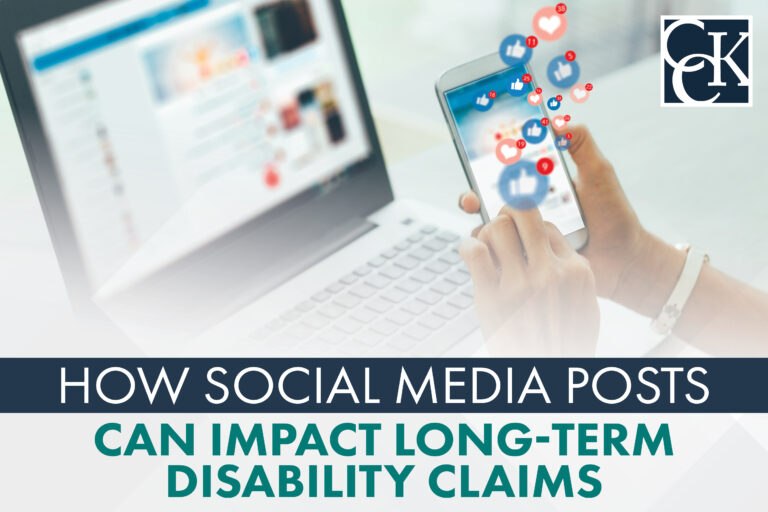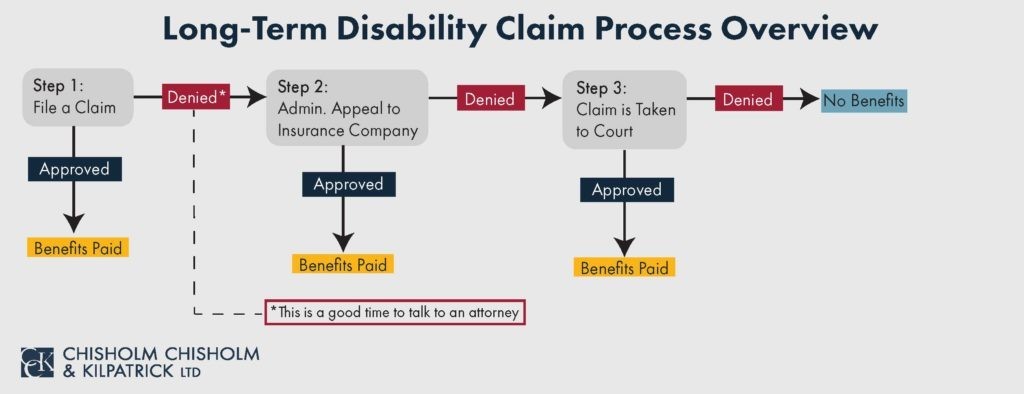How Social Media Posts Can Impact Long-Term Disability Claims

Social media has become a ubiquitous facet of life. It is everywhere we look. Most people have at least one account on some social media platform, and they may or may not post regularly. These posts may seem innocuous, especially ones as simple as a family photograph at Christmas.
Yet if you develop a medical condition that prevents you from working and you must file for long-term disability (LTD) benefits, social media may become a reason for your insurer to deny your claim.
Claimants need to be aware of the impact their social media presence can have on a claim when filing for long-term disability benefits. Likewise, even if you are already receiving LTD benefits, your social media presence could negatively impact your claim and potentially lead to a termination of those benefits. Therefore, it is vital to understand how social media posts can impact your long-term disability claims, how to combat this, and what to do if you receive a denial because of these posts.
Insurance Companies Routinely Surveil Social Media Accounts
Unfortunately, insurance companies often prioritize their financial needs, which leads to numerous denials of claims. They often utilize forms of surveillance to catch purported “inconsistencies” in a person’s claim. Many claimants may be aware of these surveillance tactics, which can include staking out a claimant’s house and taking photographs or videos of their activity. However, some claimants may not be aware that these surveillance tactics can also extend to a person’s online presence.

Insurance companies may monitor all different types of social media, including Facebook, Instagram, Twitter, TikTok, and Snapchat. Even sites such as Yelp can be used by an insurance company to try and prove a claimant is not disabled.
Typically, insurers are looking at your social media posts to discover any inconsistencies between what a claimant is posting and what they are reporting as part of their disability claim. These inconsistencies often arise from the language the claimant uses to describe their condition.
For example, absolute language, such as “I can never drive anymore”, may not be accurate. If surveillance shows you in a car driving—even if it was just for five minutes to a doctor’s appointment—the insurer may claim this is inconsistent with your claimed impairments and thus your reports are unreliable.
However, the insurance company also sometimes goes to great lengths to find a reason to deny claims via surveillance. The abovementioned example of a family photograph exemplifies this. You may have been in pain the day of the photograph; you may have been limited to sitting or lying down on the couch the entire time. But these details may not come through in the photo and thus will not factor into the insurance company’s surveillance. They will see a photograph of you at a Christmas party and may conclude that you can attend social events and thus your pain or fatigue cannot be that severe.
What Are Insurance Companies Looking for in Social Media Posts?
Typically, the insurance company will look for three main things when scouring your social media posts. They are looking for evidence regarding your physical condition, your mental condition, and your ability to work.
For example, if you suffer from a mental disorder—such as depression or anxiety—they will look for posts that counter this. They may look at photographs you have posted when you are smiling and with friends, or they may look at status updates of you being happy about something you bought. They will try to argue that this demonstrates positive mental health.
Most social media users only show a positive representation of their lives, even if it is not the most accurate representation. These posts may only, to the uploader, represent a moment in time, but to the insurance company, they represent much more.
Your days may be filled with pain, extended periods of rest, mental exhaustion, and so on. However, the insurer usually will not factor in these elements when all they see is a photograph of you smiling at the beach—even if that photograph represented the only “good” moment of the day on which it was taken.
It is also important to remember that social media posts are timestamped. When you upload an image, the insurance company can see when it was uploaded. They may try to create a “timeline” to show inconsistencies in the claim. Another issue is uploading older photos and not properly labeling them as such. If not labeled accurately, then the insurer will likely assume it is a recent photo and representative of your condition.
Additionally, insurance companies will analyze the content you post. They can use this information to ascertain your level of activity or where you may be in the future. You should remain cognizant of “check-ins.” These check-ins show where you have been. The insurance company may try to argue this demonstrates you are very active and use this against your claim.
Insurers can also use your social media posts as a guide for their in-person surveillance. If they see that you visit the supermarket once a week via your “check-ins,” they may send an agent to the market on those days to “catch” you doing something you should not be able to based on your disability or reported impairments.
Claimants Must Be Careful with Their Online Presence
Social media posts can be problematic for several reasons. Thus, claimants must be careful with their online presence. Of course, it is unreasonable to assume claimants can completely cut out social media from their lives, nor is it fair.

Rather, it is important that claimants always accurately report their symptoms and impairments to their insurer, and their activities should be consistent with this. Since social media often does not tell the full story, and since insurers often take things out of context, it is vital to be cognizant of what is being posted online.
Nonetheless, Insurance companies also look at what people tag you in on social media. So, it is not enough to eschew posting on your accounts; you must also monitor what other people are posting as they may be tagging you in photographs and other posts.
When you have become disabled and unable to work and have gone through the entire process of filing for long-term disability benefits, you do not want social media to be the reason for your denial. You must remain diligent in monitoring your accounts to ensure there is nothing that can give your insurer a reason to deny your claim or terminate your benefits.
Do Insurers Monitor LinkedIn, too?
Yes, even LinkedIn is subject to the social media surveillance tactics of insurance companies. There is a lot the insurance company can do with a claimant’s LinkedIn profile. Since LinkedIn is work-related, they may look to see what you are saying about your employment situation.
However, many professionals do not visit or update their LinkedIn regularly. For example, perhaps you did not update your employment history to reflect your current situation of living with a disability; it may show you are still working or still searching for work. The insurance company does not consider if this information is out of date. They will cite that you are publicly stating you can still work and use that as a reason that supports their claim denial.
Therefore, it is vital to keep your LinkedIn as up-to-date as possible. If you are unable to work, then you should update your profile to reflect this change.
What Happens if the Insurance Company Denies or Terminates My Benefits?
Your LTD claim may be denied because of social media posts. Likewise, your insurer may terminate the benefits that you are already receiving. In either case, you have the right to appeal their decision.

If you receive a denial or termination because of issues in your social media posts, it is crucial that you consult with an experienced long-term disability lawyer. The process of obtaining LTD benefits is complex. A long-term disability attorney will have experience dealing with such denials.
The lawyers at Chisholm Chisholm & Kilpatrick have seen these kinds of denials before, and we know how to combat them. Often, the explanations the insurance company gives are not adequate and are stretching the reality of the claimant’s situation. We hold the insurers accountable for their actions. We believe you should not have to worry about this process, especially when you are trying to manage your debilitating condition.
Call CCK Law Today
If you are suffering from a debilitating medical condition preventing you from working, you may be filing for long-term disability benefits. However, you must be cognizant of the tactics insurance companies use to deny claims, which includes monitoring claimants’ social media accounts.
You must be careful with what you post. A simple, seemingly innocent post may be viewed drastically differently by your insurer. In any case, CCK Law is prepared to help you. We understand ERISA and have gone up against all the big-name insurance companies. If you are facing a denial or termination of benefits, we may be able to assist you so that you may receive the benefits you deserve.
Call CCK Law today at (800) 544-9144 for a free case evaluation with a member of our team. We will evaluate your case and see if we can help.
About the Author
Share this Post

